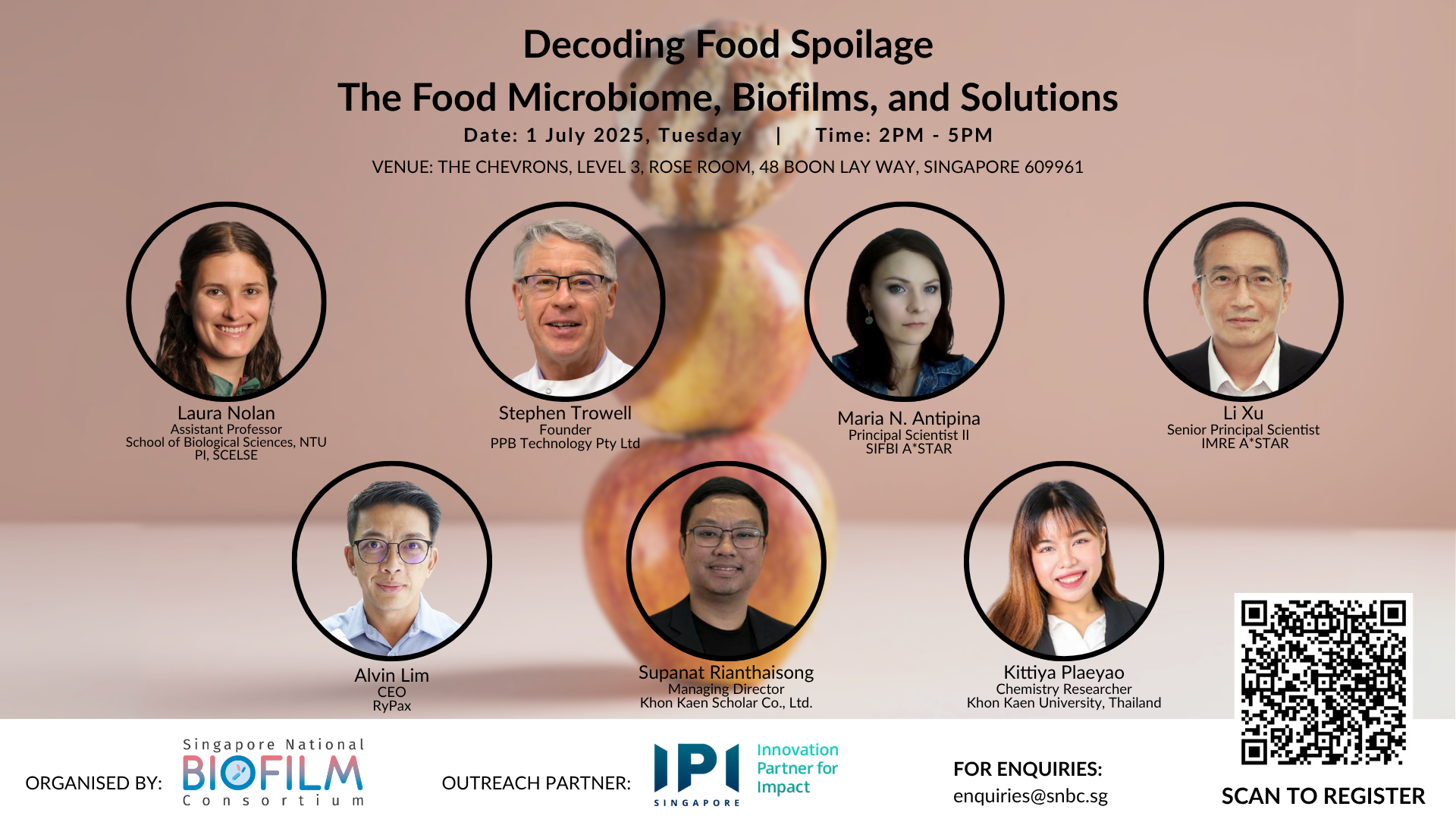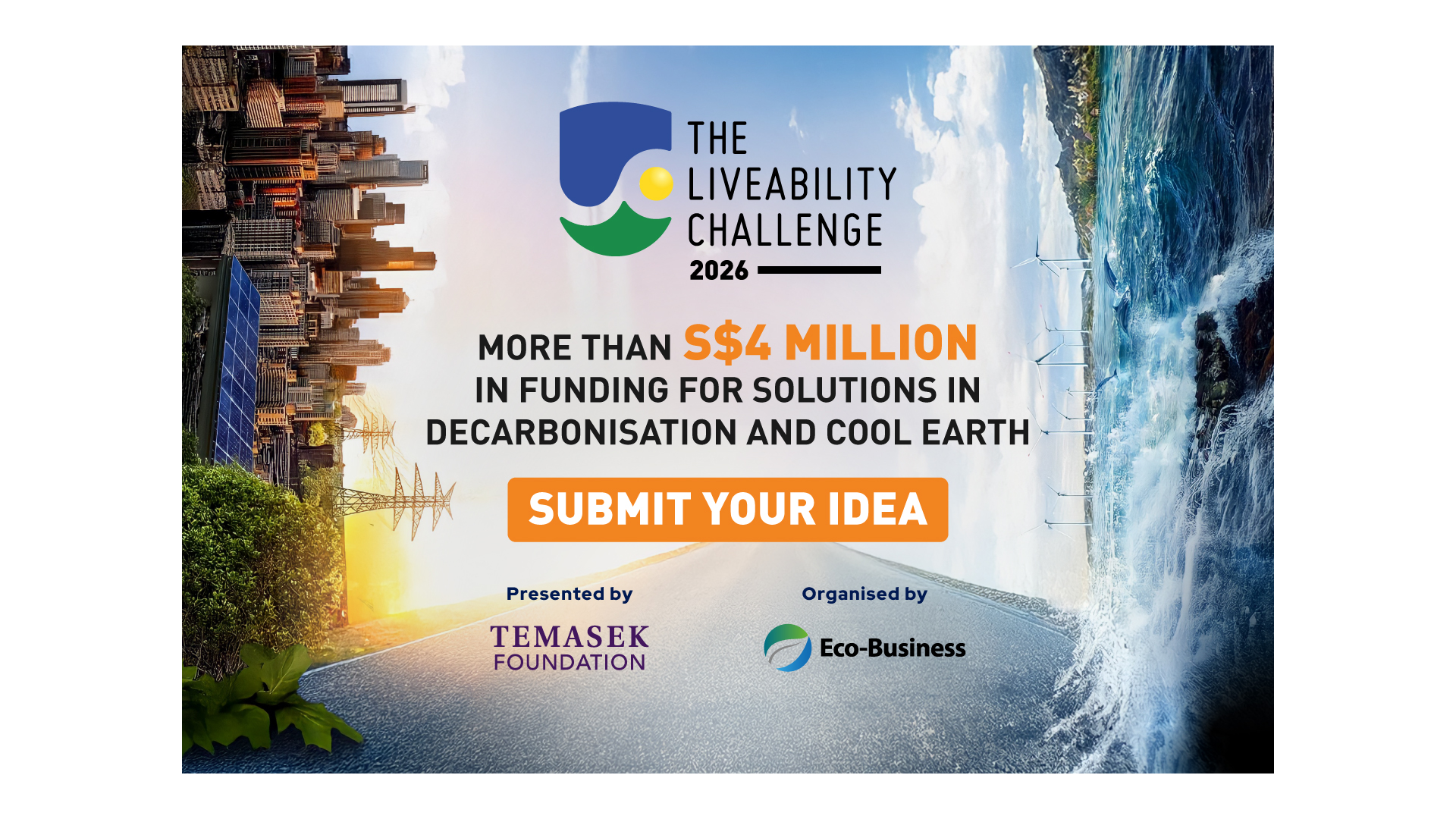Overview
Approximately one-third of global food production, about 1.3 billion tons, is wasted annually. Food waste accounted for about 11 per cent (755,000 tonnes ) of the total waste generated in Singapore in 2023. The presence of microorganisms, especially bacteria, yeast, and mould cause food spoilage due to improper storage conditions. Investments in technologies and services that address food spoilage are crucial for enhancing food security, economic efficiency, and environmental sustainability.
This workshop aims to foster dialogue on fundamental understanding of food spoilage, emerging, sustainable antimicrobial technologies for improving shelf life, food testing as well as antimicrobial food packaging to curb food spoilage. This focused workshop would provide opportunities for academic and industry stakeholders to explore collaboration opportunities to combat this important field.
Schedule
Date: 01 Jul 2025, Tuesday
Time: 2:00 PM - 5:00 PM (GMT +8:00) Kuala Lumpur, Singapore
Location: Rose Room, Level 3, THE CHEVRONS Boon Lay Way 48, 609961
Speakers
Speaker's Profile:
Dr Laura Nolan, Assistant Professor, School of Biological Sciences, NTU; PI, SCELSE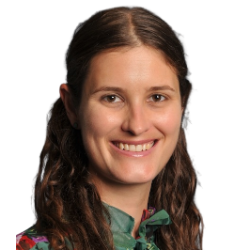
Dr Nolan’s research group focuses on understanding how microbes form complex communities called biofilms in a range of settings, including those relevant to the food chain. Her lab uses a systems biology approach to obtain a detailed molecular mechanistic understanding of biofilm development and community interactions. The aim is to then use this information to direct interventions that reduce biofilm formation and/or modulate the composition of biofilms. The lab’s food chain-relevant translational goals include interventions that target biofilms formed by food spoilage microbes and foodborne pathogens to extend food shelf life and increase food safety.
Speaker's Profile:
Dr Stephen Trowell, Founder, PPB Technology Pty Ltd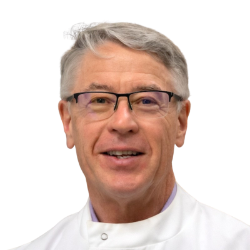
Stephen obtained his honours degree in biochemistry from Cambridge University and a PhD in biochemical neuroscience from the Australian National University. After a postdoctoral fellowship at the ANU, he moved to Australia's national research agency, the CSIRO, where he led a number of impactful R&D projects over three decades. In 2018, Stephen founded PPB Technology to commercialise CYBERTONGUE®, acquiring the patent portfolio, raising capital and commencing sales in 2023. Stephen’s team has used this technology to investigate the significance of Pseudomonas biofilms on raw milk quality globally.
Speaker's Profile:
Dr Maria N. Antipina, Principal Scientist II, SIFBI A*STAR
Maria N. Antipina obtained her Ph.D. degree in biophysics from the Lomonosov Moscow State University (Russia) in 2004. She moved to the Max Planck Institute of Colloids and Interfaces (Potsdam, Germany) in 2005. In October 2005, Maria N. Antipina was awarded the Incoming International Fellowship of the Alexander von Humboldt Foundation to carry out a research project on artificial viruses for gene delivery. In 2007, Maria N. Antipina joined A*STAR (Singapore). She worked as a Research Scientist at the Institute of Materials Research and Engineering till June 2020 before moving to the Singapore Institute of Food and Biotechnology Innovation, where she is currently working on new functional food ingredients.
Speaker's Profile:
Dr Li Xu, Senior Principal Scientist, IMRE, A*STAR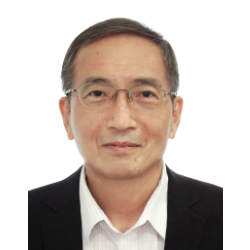
Dr. Li Xu is a Senior Principal Scientist at Institute of Sustainability for Chemicals, Energy and Environment (ISCE2) and Institute of Materials Research and Engineering (IMRE) of Agency for Science, Technology and Research (A*STAR), where he leads a research team dedicated to studying polymer nanocomposite for various applications, including sustainable packaging. As an Adjunct Associate Professor at the Department of Food Science and Technology of National University of Singapore, his research is on food preservation by using hybrid polymers. His oxygen barrier and oxygen scavenging technology have been successfully applied to produce recyclable sustainable polyolefin food packaging.
Speaker's Profile:
Mr Alvin Lim, CEO, Rypax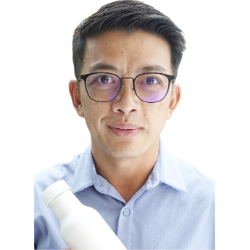
Alvin Lim has over 20 years of work experience in sustainability. Alvin founded RyPax (2004 USA) & NBCo (2023 Singapore) with the goal of rethinking packaging & reducing the use of plastics. As the CEO of RyPax, Alvin has executed the conversion of packaging of the electronics industry to fiber. His work continues to replace billions of units of plastics annually. With NBCo, Alvin is focused on applying new wet molded fiber technologies to replace single use plastic bottles & food trays with fiber. This work has led to significant collaborations in biocoatings with companies across the world and exploratory studies with packaging institutions. Alvin Lim has completed the Executive Education for ‘Sustainability Leadership Program’ at Harvard University and ‘Strategy in the Age of Digital Disruption’ at INSEAD. Alvin also graduated from the University of Southern California with a MBA and a Bachelor’s of Accountancy from Nanyang Technological University.
Speaker's Profile:
Supanat Rianthaisong, Managing Director, Khon Kaen Scholar Co., Ltd.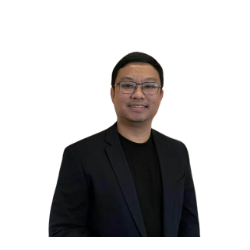
Mr. Supanat Rianthaisong is a Thai entrepreneur and researcher specializing in sustainable innovation and biotechnology. He holds a Bachelor of Science in Chemistry (Second Class Honors) from Khon Kaen University and has led cross-disciplinary projects at the intersection of science, sustainability, and industry. As Managing Director of Khon Kaen Scholar Co., Ltd., Mr. Supanat spearheads a project focusing on biodegradable plastic and packaging solutions, collaborating closely with a Singapore-based technology partner NBCo and academic institutions in Thailand. His current research interests include biofilm-resistant materials for food packaging, microbial interactions in food spoilage, and scalable biopolymer production using local agricultural waste.
Speaker's Profile:
Ms Kittiya Plaeyao, Chemistry Researcher, Khon Kaen University, Thailand
Kittiya Plaeyao is a chemistry researcher pursuing her M.Sc. in the International Program at Khon Kaen University, Thailand. Her work focuses on developing biodegradable silver nanocomposite bioplastics from sugarcane bagasse for food packaging. She has published in leading journals, holds a Thai petty patent, and has gained international research experience in Japan and Canada. Kittiya has earned several awards for innovation and entrepreneurship, and she continues to contribute to sustainable materials research.



